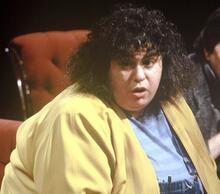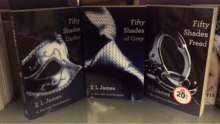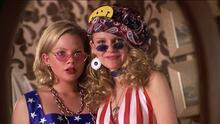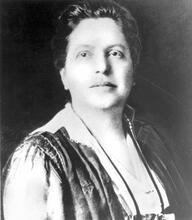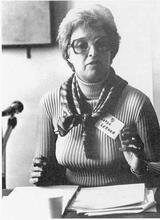Andrea Dworkin
Poet, writer, and activist Andrea Dworkin on After Dark in 1988.
Courtesy of Open Media, Ltd. via Wikimedia Commons.
A lightning rod for controversy, American feminist Andrea Dworkin denounced violence against women, advocated women’s self-defense, and drafted legislation claiming that pornography violated women’s civil rights. After fleeing her abusive husband in 1971, Dworkin co-wrote Woman Hating with feminist Ricki Abrams. They charged that pornography incited violence towards women and consensual sex subjugated women. In 1983, Dworkin drafted legislation laying out a legal principle that pornography violated women’s civil rights. While the US Supreme Court overturned the legislation, it highlighted a fundamental conflict between First Amendment rights to free speech and equal protection guaranteed by the Fourteenth. Dworkin wrote and lectured widely on rape, domestic violence, and the need for women to fight back.
“Every century, there are a handful of writers who help the human race to evolve. Andrea is one of them.” This encomium from Gloria Steinem may, however, be balanced against another comment, by the British critic John Berger, who maintained that Dworkin was “perhaps the worst misrepresented writer in the Western world.” Together, the two statements convey not only Dworkin’s brilliance but also the perhaps predictable antipathy, hostility and even ridicule evoked by the forceful and impassioned attacks on pornography and violence against women for which she became famous—or notorious.
Early Life and Family
Andrea Rita Dworkin, who alleged that “I used everything I know—my life—to show what must be shown, so that it can be faced,” was born on September 26, 1946, in Camden, New Jersey, which she described as a “wild, hard, corrupt city,” but one in which the schools were racially and ethnically mixed. The normal pleasures of childhood street play and friendships which she enjoyed in her first—and what she called her “true”—home in a row of brick houses were interrupted when she was ten years old, with the family’s move to Delaware City, a.k.a. Cherry Hill, which was virtually all-white and, in Dworkin’s view, intellectually arid.
The move, which displeased her, was necessitated by the chronic ill-health of Andrea’s mother, Sylvia, the child of immigrant parents from Hungary, who suffered from a heart disease that resulted from a bout of rheumatic fever contracted in childhood, and who therefore spent frequent periods in hospital or bed-ridden at home. Nevertheless, she lived until 1991, when she died, aged seventy-six. Intellectually precocious and wildly unconventional in her behavior, Andrea had a love-hate relationship with her mother, whom she adored but by whom she felt repudiated. Though there was ultimately an almost complete rift between them, she later wrote admiringly about her mother’s “Herculean strength in the face of pain, sickness, incapacitation, and the unknown.”
In contrast with this difficult relationship, Andrea enjoyed a warm and excellent relationship with her “gentle, soft-spoken” father, Harry, the son of a Russian Jew who had run away from Russia at the age of fifteen to escape army service. Harry’s devotion to his family led him to work long hours, during the day as a school-teacher (and, later, as an educational counselor at a boys’ academic high school in Philadelphia and at a private school for dropouts trying to get their high-school diplomas) and at night unloading packages at the post office. Although he attended college classes on Saturdays, he never attained the Ph.D. degree for which he yearned. Unlike his wife, he enjoyed Andrea’s intelligence and treated her with respect.
Andrea also had an excellent relationship with her brother Mark, who was born in 1949. Although there were frequent periods in their childhood when their mother’s hospitalizations led to the children’s being farmed out separately to various family members, and although, in adulthood, there was an eleven-year period during which they were in contact only by correspondence, the siblings remained very close. Mark, who became a molecular biologist, married a fellow researcher, Eva Rastl, an Austrian Catholic. The couple worked together at Columbia University as well as at the Ernst Boehringer Institut in Vienna, where he became chairperson of the department of molecular biology. While researching the metabolism of cancer cells, Mark was himself stricken by cancer. He died on April 30, 1992 and was buried in the Jewish section of Vienna’s Central Cemetery. At the funeral service, Harry Dworkin refused to sit with the men, instead joining Andrea and Eva in the women’s section of the synagogue.
A Victim of Sexual Violence
When Andrea was nine years old, she was sexually molested by a stranger—a sexual experience that was later repeated, though with her unspoken consent, when she began a relationship with a high-school philosophy teacher who, even while exploiting her sexually, introduced her to the works of Sartre and Camus. She had already much earlier been a precocious reader; at the time of her “rape” she had a paperback of Baudelaire’s poems with her. Throughout high school, she was—to use her own words—“messing with men,” earning through prostitution the money she needed for her frequent forays into Greenwich Village, where she became acquainted with New York’s bohemians, among them Alan Ginsberg, whom she greatly admired. In 1964, with scholarships and loans taken out by her father, she went to Bennington College, where she continued her erratic studies of literature and philosophy, distracting herself with drugs, sex and politics.
In February 1965, while protesting America’s involvement in Vietnam outside the U.S. Mission to the United Nations, she was arrested and spent four days at the city’s Women’s House of Detention, where she was subjected to sadistically intrusive body searches by police and nurses and brutally examined by two male doctors, who “tore [her] up inside with a steel speculum” and verbally tormented her. This traumatic experience led her—with the encouragement of Grace Paley, who instantly befriended her—to send letters to leading New York papers, protesting the treatment meted out to the women prisoners at the House of Detention. The city was forced to conduct a grand jury investigation and, although the prison was eventually vindicated, it was closed down by John Lindsay, the Republican mayor, who had challenged the Democratic incumbent, Robert Wagner, on this issue. Dworkin went abroad after the incident, first to Greece, where she published a small volume of poems, Child (Heraclion Press, Crete, 1966), returning intermittently to Bennington. She submitted her final thesis by mail and in 1969 it was, fittingly, her father who attended the graduation ceremony to receive her degree.
Towards the end of 1971, after three years married to a violently abusive Dutch political radical, Dworkin left her marital home and in November 1972 fled the Netherlands, the country where she had resided for five years, much of the last of which she had spent living rough, persecuted, harassed and even threatened with murder by her husband. A feminist named Ricki Abrams not only gave her asylum but also introduced her to American feminist literature with which Dworkin was unfamiliar. Together, the two women began to collaborate on what eventually became Dworkin’s first major work on male dominance and sexual violence, Woman Hating (1974). In it, she opposed all forms of pornography (which both she and her husband had read), because she believed it incited violence against women. The book was also critical of consensual sex between women and men, which she perceived as an act of everyday subjugation in which women were accomplices. In her view, marriage was “a legal license to rape.” Her need “to try and make people understand how destructive and cruel battering is—and how accepted by society,” later led her to publish two essays on the subject: “A Battered Wife Survives” (1978) and “What Battering Really Is” (1989), both included in Letters from a War Zone (1989). Following the acquittal of O. J. Simpson for the murder of his wife, Nicole Brown, she followed up with “Patterns of Pain,” which was published in the L. A. Times on January 26, 1994.
A brilliant and inspiring orator, Dworkin began to speak frequently at public meetings and in 1978 addressed the historic rally in San Francisco at which three thousand women who were attending the first feminist conference on pornography held the first “Take Back the Night” march.
Legal Action
In 1980 Dworkin asked Catherine A. MacKinnon, a Yale law professor, to help her bring a civil-rights suit for Linda Marchiano, a.k.a. Linda Lovelace, who had been coerced into pornography, including making a film called Deep Throat. They discovered that there was no current law under which to help, but in 1983, while co-teaching a course on pornography at the Minnesota Law School, they were commissioned by the Minneapolis City Council to draft a local ordinance that would embody the legal principle that pornography violates the civil rights of women. (The complete text of the ordinance was published in 1992.) The law they drafted allowed women to sue the producers and distributors of pornography for damages in a civil court. Passed in Indianapolis in 1983, the law was subsequently overturned in the U.S. Supreme Court, as the result of a case initially brought by the American Booksellers Association and the American Publishers Association. It has been said that her original legal theory—that harm done to women ought not to be legally protected just because it is done through “speech,” and that sexual abuse denies women’s speech rights—not only fomented a rift between advocates of civil rights and civil liberties, but also generated a constitutional crisis, a fundamental conflict between the First Amendment, which stipulates freedom of speech and of the press, and the Fourteenth, which reads: “No state shall make or enforce any law which shall abridge the privileges or immunities of citizens of the United States; nor shall any state deprive any person of life, liberty, or property, without due process of law; nor deny to any person within its jurisdiction the equal protection of the laws.”
Publications and Public Response
Although Dworkin’s books were repeatedly rejected by U.S. publishers, her devoted agent, Elaine Markson, succeeded in having them published in the United Kingdom, where they enjoyed an enormous critical and popular success. An hour-long documentary made by the BBC, entitled “Against Pornography: The Feminism of Andrea Dworkin,” was watched by a record number of viewers and syndicated throughout Europe and Australia, but it has yet to be shown in the U.S. In 1992 the BBC invited Andrea Dworkin back to participate in a nationally televised debate on “political correctness” at the Cambridge Union.
Altogether, Dworkin published ten works of non-fiction, including Scapegoat: The Jews, Israel and Women’s Liberation (2000), a political explication of the nation of Israel, three works of fiction (one of which, Mercy [1990], contained as part of its treatment of serial rape a searing account of the mass suicides—or murders—enacted on Masada), and numerous articles.
At the time of her death, this indomitable woman was in the process of preparing a new book, Writing America: How Novelists Invented and Gendered a Nation, a response to the nationalism that fueled the war on Iraq. Like her earlier work Intercourse (1987), it was to use literature “to explicate the paradigm of dominance and submission involved in sexual intercourse.” She expected to complete it within three years.
Jewish Background and Intersectional Identities
Dworkin visited Israel in December 1988 to participate in the First International Jewish Feminist Conference, organized jointly by the Israel Women’s Network, the American Jewish Congress and the World Jewish Congress and held in Jerusalem. At this time she also enjoyed stimulating encounters with Jewish and Arab radical feminist activists, who made her aware of the inequities, both sexual and racial/ethnic, that existed in the country.
Dworkin refers to her Jewish background only tangentially in the long autobiographical essay she wrote in 1994, stating that she “began to think about survival very early,” in part because “we were Jewish on the heels of the Holocaust.” Indeed, most members of the families of both her parents had been murdered by the Germans. In an article published in Ms. magazine, also in 1994, she described how, when she was ten years old, she had witnessed an aunt who had been in Auschwitz-Birkenau experience what Dworkin referred to as a “flashback” of her experiences. (In the same article, “The Unremembered: Searching for Women at the Holocaust Memorial Museum,” she excoriated the institution for its blatant minimalization of women’s experiences in the Holocaust.) At Bennington she spent time reading transcripts of the Nuremberg trials of war criminals and she admitted to having read Holocaust material compulsively.
In Scapegoat Dworkin makes a direct comparison between antisemitism and sexism, on the one hand, and between Zionism and women’s liberation, on the other. She surprised many of her left-wing readers by praising Jews for demanding a country of their own and being prepared to fight for it. “The Israelis are my guys,” she wrote, going on to justify the conquest of the land as being the result of centuries of antisemitic violence. However, she went on to admit that “brutality has become institutionalized in Israel as expressions of male dominance and state sovereignty—over Jewish/Israeli women as well as over Palestinian men and women.” She argued that the victimization of Jewish men in pogroms had led to their determination to demonstrate their masculinity by fighting to create a Jewish state, but over time that masculinity led to a machoistic approach to Israeli women as well as to the Arab male enemies.
Dworkin went on to compare women’s position in all societies with that of the Jews: all were scapegoats, victims of male violence and frustration. Since it was legitimate for Jews to respond with force in order to defend themselves, it should be equally so for women. In other words, women had the right to kill men who abused them. (She had already maintained this in 1991, at a speech to a conference on women and mental health, and also repeated the view in her article about Nicole Brown Simpson.)
But between the visit to Israel and the completion of Scapegoat, Dworkin published a long article in Ms. magazine, entitled “Israel: Whose Country Is It Anyway?” In this she described not only her Zionist upbringing and Hebrew school experiences, but also her eye-opening experiences after the “middle-class” Feminist Conference: from more radical women she heard about the actions of the Israel Defense Forces in the disputed territories, about wife-battering, about discrimination. She referred to her participation in a Women in Black Arab-Jewish peace vigil.
Later Years
For the last twenty years of her life Andrea Dworkin lived happily with her devoted feminist partner, John Stoltenberg, holder of a M.Div. degree from Union Theological Seminary. A writer and editor who founded Men Against Pornography, he is the author of Refusing to be a Man: Essays on Sex and Justice (1990) and The End of Manhood: A Book for Men of Conscience (1993). In 1994 he published “Living with Andrea Dworkin” (Lamda Book Review, May–June 1994). They married in 1998. In informing the world of Andrea Dworkin’s death on April 9, 2005—“peacefully in her sleep, after long battles with illnesses and an especially difficult week”—he ended with the moving and eloquent words, “She was my life.”
Selected Works by Andrea Dworkin
Books
Non-fiction
Woman Hating (1974);
Our Blood: Prophesies and Discourses on Sexual Politics (1976);
Pornography: Men Possessing Women (1981);
Pornography and Civil Rights: A New Day for Women’s Equality (1988);
Intercourse (1988);
Letters from a War Zone: Writings, 1976–1987 (1988);
Right-Wing Women: The Politics of Domesticated Females (1991);
Life and Death: Unapologetic Writings on the Continuing War against Women (1997);
Scapegoat: The Jews, Israel, and Women’s Liberation (2000);
Heartbreak: The Political Memoir of a Feminist Militant (2002).
Fiction
The New Woman’s Broken Heart: Short Stories (1980);
Ice and Fire (1986);
Mercy (1990).
Essays
“Israel: Whose Country Is It Anyway?” Ms. magazine, Vol. 1, Number 2 (September/October 1990);
“The Unremembered: Searching for Women at the Holocaust Memorial Museum.” Ms. magazine, Vol. 5, No. 8 (November/December 1994);
an autobiographical essay in Contemporary Authors Autobiography Series, vol. 21: New York: 1995.


